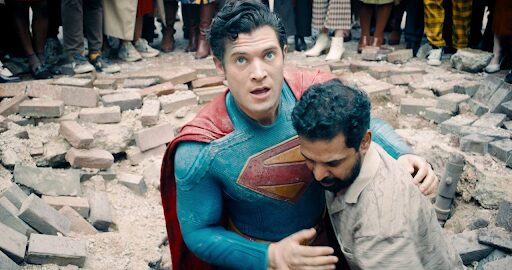I’m sick of figuring out what Superman represents. Nothing really feels real anymore, everything material now superseded by how the anonymous masses are meant to perceive it. We discourse and discuss, but to what actual avail? To reward those who present their perception with the most sheen? What does anyone actually do anymore?
We are deep in the shit right now—there is no reason for us to care about the representation of a person, object, or idea. Once a self-prophesied progressive beacon, Barack Obama continues to cash in on private fundraiser speaking fees and bunk Netflix deals off the “hope” his two terms in office never delivered. What can you give me? What is the Democratic establishment actually doing for us? PARASITE winning Best Picture in 2020 was one of the most gratifying moments of my life, but why? I didn’t win that trophy. I certainly didn’t land a job in the entertainment industry thanks to it; in fact, thanks to the demise of cinema as a permanent fixture of central culture and the Palo Alto-fication of Hollywood, most of us have been booted from our fields entirely! A vanilla Blu-ray of PARASITE sits on my shelf begging to be meaninglessly upgraded to the Criterion, while every international entertainment industry has, in a surprisingly dialectical turn, contracted as the content output grows in global esteem. The niches have never been more isolated, and the general entertainment never more catered to its country of origin. The film’s since been ranked as the best of the 21st century by The New York Times (enjoying a clamored cultural revival after years of laundering genocide and disastrous neoconservative op-eds), but the only impact Bong’s masterpiece has really had on the fascist oligarchy henceforth referred to as the United States is contributing that one reaction frame of Song Kang-ho grimacing as he couriers his client’s wife from one specialty grocer to the next. I suppose I have one more way to dogwhistle my disdain.
So, no, I don’t really give a shit that Superman stands for truth, justice, and the American way in a time when cynicism reigns. I’m glad everyone’s chillier and angrier than usual! Look around, you fucking ape! There are no bananas going around. The forests are burning! You are being skinned for your fur by poachers that the other gorillas are rooting for in hopes they will one day get to do the skinning, and you want me to be grateful that I get to pay money to watch a fake-ass superhero be nice? What does Superman actually do? When I look around, I see Superman as a shuttered Six Flags Magic Mountain rollercoaster, a $15 Target T-shirt fitting too snugly on a 42-year-old adult male from Ohio, two contemporary comic runs you could call decent (let alone name), and a film IP so devalued that its previous star couldn’t contractually maneuver shaving his facial hair for JUSTICE LEAGUE re-shoots lest he fuck up the continuity of playing a MISSION: IMPOSSIBLE heavy. What I am interested in is CEO of DC Studios James Gunn’s mission with SUPERMAN, the first feature-length installment in a medium-spanning franchise balloon that Gunn took upon himself to author from tip to toe. It’s a ballsy venture: The full weight of Warner Brothers’ fiscal future lies in the balance of James Gunn rebooting the reviled DC Universe after only a year-and-a-half of downtime and a worst-case-scenario $900 million target gross and this motherfucker makes the B-plot (not C! B!) Lois Lane and Mr. Terrific (???) breaking into Lex Luthor’s pocket dimension space jail to save Superman from the Kryptonite-coated clutches of Metamorpho. Okay, you got me, I’m listening.

I give him guff, but Superman is one of the great comic book characters because—like his big brothers Moses and/or Jesus—the broad perfection that renders him so dull simultaneously allows every new author to hyper-fixate on a different assembly of powers. There are Superman stories about his super strength, heat ray, freeze breath, time traveling, flight, speed, X-ray vision, brain, brawn, and how one or all of them are either saving the universe or ruining lives. A definitive studio rendition is bound to hiccup with that creative freedom, and this one tries waylaying that challenge by pretty much just forgetting that all the other powers aside from the four you can most easily design toys after exist.
Here we have a Superman who begins the film rushing back into the fray at around 80% HP and spends the third act catching word of two world-shattering catastrophes from a cable news broadcast. Brother, you have super hearing, what the fuck is going on? Gunn clearly wants to adapt ALL-STAR SUPERMAN (the one Superman comic run you’ve heard of outside of THE DEATH OF SUPERMAN), but intrinsic to Grant Morrison’s lovely chronicle of the veteran hero’s final days is just that… ALL-STAR SUPERMAN is one last cosmic waltz through the icon’s century-spanning gallery of rogues, victories, and fated losses. That story only works because, spoilers, it ends with Superman leaving his corporeal body and transcending into sunlight itself. With SUPERMAN entrusted with launching a multimedia content blitz, that grace is unobtainable, so we are once again saddled with a buff titan who solves the universe’s problems with his fists.
Brutishness is forgivable as origin, but crushingly disappointing for a hero already three years into his tenure. However, on a moment-to-moment basis, SUPERMAN is still a fun film to exist in. Even when saddled with the ugly ultra-wide style of GUARDIANS OF THE GALAXY VOL. 3, Henry Braham’s nearly fisheye lenses capture a genuine grandiosity that frames well on the biggest possible screen (the less we mention the heinous color grading of everyone’s grey skin, the better). There’s a size and scope to this you buy into much more readily than the entirely computer-generated efforts from Marvel as of late. James Gunn’s work regularly carries itself with the rambunctious sass of a sitcom-ready child (the Justice Gang and Jimmy Olsen’s larks beam in from a meaner era), but in its more straightforward fantasy-drama unspooling, SUPERMAN charmingly marches through the halls of its own Metropolis like a sixth grade student council candidate campaigning for longer recesses. David Corenswet manages his tone and gait like a prom king, valedictorian, and band geek rolled into one as he rattles off the beats of Gunn’s screenplay with winsome frankness. The most entertaining parts of the film aren’t the collapsing skyscrapers, they’re moments where you don’t know if Superman is going to laugh, cry, or even keep his cool. It’s, thankfully, a talky superhero flick, because around the fifth time Superman swoops in to catch a falling object at the last second, you’re begging for another toy to play with. The action lacks distinct beats, and Superman’s powers any variety, so it leaves the character dynamics to refresh us.

Those refreshments are found in unexpected pairings. The film’s villain, Nicholas Hoult’s smarmy turn as Lex Luthor, is neutered by Superman’s true foil, Krypto, an untrained wonder mutt who’s introduced like all the other goofy deep-bench lore Gunn extricates from the annuls of DC: rapidly, barring explanation, and yet presented with an impressive selection of traits that makes C-tier obscurities instantly chummy with our sensibilities. Krypto is the untethered wrecking ball of Kryptonian supremacy that Luthor dedicates his livelihood to convincing the public Superman is (and what his intergalactic parentage intended him to become), and the animalism rears its head in surprisingly violent outbursts. Krypto isn’t just a pooch who doesn’t listen to his beleaguered owner, he’s a bum-rushing predator intent on breaking his toys in a dog park called Earth—the same description can be attributed to Kal-El’s narrow justifications for his global interventionism. And yet, when the dog is abducted by LexCorp, Superman moves mountains to retrieve a scared creature that, as he learns, would do the same for him. Just like that, we learn about what Superman has done, would do, and will do. Ta-dah. Every plot arc is approached with this same narrative economy and intertwinement. In fact, Luthor is closer to an audience analogue, his obsession over Superman a nigh-requirement for anyone buying a ticket hoping to keep up with the film’s breakneck yarn-spinning. Gunn’s clever plotting reveals the origins, present, and possibilities of his new universe; every character has a personal history with Superman, prior conceptions of the characters around them, current perspectives that drive their behaviors, and a contractual guarantee that possibilities beyond what SUPERMAN draws out will be carried through in sequels and spin-off television series. You blink and suddenly you’re in a cobweb, but to Gunn’s credit, it’s a web most franchises only achieve by the time they crank out an AGE OF ULTRON.
Casting total unknowns as Superman and his Kansas parents (and hinging your plot on fucking Metamorpho) aren’t the only risks in this perplexingly political piece of American cinema. In brief, Lex unleashes false flag Kaiju events to allow the invasion of PalkisTaiwRaine (Jarhanpur) by IsraeChIndiUssia (Barovia) and its evil leader: David Ben-Gurion. For as cobbled together the visual analogue of the fictional country of Jarhanpur is (though the ocean of brown skin facing off against an Anglo military is uniform), holy shit, there really is no denying that this disheveled slime is the primary national founder, pioneering génocidaire, and first prime minister of the State of Israel, David Ben-Gurion. The uncanny resemblance makes his violent murder all the more vindictive, and while I didn’t know James Gunn had that dog in him, I’m also dubious of the peak-Obama-era catharsis we reap from watching a Mexican-American superhero annihilate a European dictator on his own soil. The wet fart critique would harp on the rounded endorsement of US interventionism so long as you intervene virtuously, but, hold on, let me take a whiff of this “Hope” shit… SUPERMAN presents a radical liberationist simplicity that supposes something as horrid as the Israeli invasion of Gaza would require an extrajudicial force of righteous violence to save the lives of millions. Really, it cannot be overstated how insane this subplot is, and for one of the most nakedly pro-Palestinian expressions in popular culture to be front-and-center in a Superman movie.
A highlight of the first act (and a better first impression than the muddy Metropolis punch-out) is a nervy interview between Lois and Clark that begins as foreplay and concludes as a Man of Steel monograph. As Superman emotionally outbursts in response to every one of her probes, we witness an alarming vulnerability from a being so powerful. If introspection this superficial (and triggered by inquiries that any professional journalist would be able to fend off with similarly word-vomited refutes) can dent the armor, then maybe we should fear this God among men. The whole sequence scratches the same itch as CLERKS’ infamous dissertation on the senseless murder of innocent Death Star construction contractors: a smidge of neoliberal fascist apologia, a smear of schoolyard overthinking, and a hearty scoop of reflective imagination. Lois’ Hasbara-spouting sounds level-headed, but when a flustered Superman shouts that he couldn’t stand back and let people die, the spirit of Michael Jamal Brooks springs out of the titular hero. He’s right. This conflict between Barovia and Jarhanpur really isn’t complicated. Barovia doesn’t have a right to exist and Jarhanpur must be granted its total sovereignty! Yeah, actually, it is that simple!

We’re far from the ballpark of Snyder’s scripture that good Christians sometimes must do horrible things. What if everyone just did good things all the time to save the lives of others? What ensues is a refutation of ethics—all ethics—the film arguing that most codes and methods of international diplomacy really just ensure the complacent destruction of the innocent. People are being killed, and children are dying. Superman violates international law by forcefully enacting his heroism beyond American borders, so the Daily Planet best sell the story that the oppressor is acting in self-defense, and Clark best stay his broccoli-perm-having-ass at home to let Barovia exploit its $80 billion of LexCorp arms to colonize a neighboring country. James Gunn is presenting this idea not as food for thought but as blatantly ridiculous. Folks, what is a border if not itself an enablement of violence? And what good are we if we don’t set aside all of our worldly desires to dismantle the entire elite class of tech billionaires writing our futures for us? Buddy, are you smelling what I’m smelling? Woke is back, motherfuckers.
Alas, this is what James Gunn’s SUPERMAN represents. It’s a mighty fine delusion. In actuality, it’s a furious retort to his Disney firing over edgy Tweets, and an atonement for his human moments of joking about child-fucking that sands down images of Palestinian suffering to triumphantly climax his first at-bat as CEO. He’s got a stranglehold on one of the most powerful positions in Hollywood, and James Gunn still can’t summon the guts to say that he’s writing about Israel/Palestine. Stakes sure feel a lot lower now, huh? I can write a whole separate paragraph about how I think this film should’ve started with a WATCHMEN-inspired collage of the first 300 years of this universe’s metahuman history rather than subjecting us to white expository text on a frosty Antarctic backdrop, but what’s the point? SUPERMAN is dependent on the audience’s knowledge of the “Superman” brand rather than introducing us to this specific Superman. As inventive as the storytelling is, it also robs this freshly minted world of its own identity, enticing you to return for future entries by dangling the decade-long carrot on a stick like an in-frame boom mic. Our insides can turn all mushy at the symbolic heart of kindness being the new punk rock, but at the film’s beating heart is a PRODUCERS type gambit: This movie needs to be good enough to springboard yet another extended universe, but not great enough for future installments to be “not as good as SUPERMAN.” James Gunn isn’t here to present excellence, he’s here to sell potential. What is meant to be a messianic exemplum of pop culture to help us navigate the storm is really just a sermon to itself. SUPERMAN will not save us, but it’s the closest any of us will get to being chauffeured like a Warner Bros. Discovery board member.
















Comments